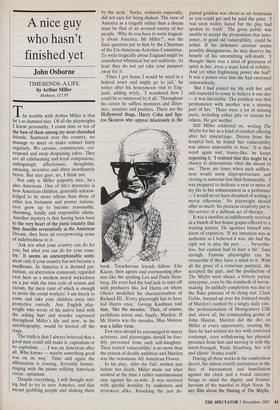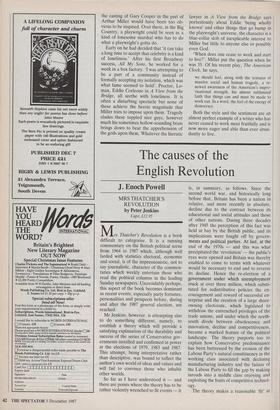A nice guy who hasn't finished yet
John Osborne
TIMEBENDS: A LIFE by Arthur Miller Methuen, £17.95 The trouble with Arthur Miller is that he's so damned nice. Of all the playwrights I know personally, I count nine or ten of the best of them among my most cherished friends. Scattered over the country, we manage to meet or make contact fairly regularly. We carouse, commiserate, cor- respond and swap despairing jokes. They are all exhilarating and loyal companions, unfeigningly affectionate, thoughtful, amusing, inventive and often inordinately brave. But nice guys, no, I think not.
Not only is Miller palpably nice, he's also American. One of life's mysteries is how American children, generally acknow- ledged to be more odious than those of other less fortunate and poorer nations, ever grow up to become reasonable, charming, kindly and responsible adults. Another mystery is that having been born to the very heart of the panic insanity that they describe reverentially as the American Dream, they have an overpowering sense of indebtedness to it.
`Ask not what your country can do for you, but what you can do for your coun- try.' It seems an unexceptionable senti- ment only if your country has not become a madhouse. In America it is deemed pat- riotism, an aberration commonly regarded over here as a modern moral wickedness on a par with the twin evils of sexism and racism, the mere taint of which is enough to invite the social workers' 4 am knock to come and take your children away into protective custody. Any English play- wright who wrote of his native land with the aching hurt and wonder expressed throughout Miller's life and now, in his autobiography, would be hooted off the stage.
The truth is that I always believed that a good man could still make it, capitalism or no capitalism . . . I was an American after all. Who knows — maybe something good was on its way.' Time and again the affirmation is rousing, fervently honest, ringing with the prime rallying American virtue: optimism.
`Despite everything, I still thought writ- ing had to try to save America, and that meant grabbing people and shaking them by the neck.' Necks, rednecks especially, did not care for being shaken. The view of America as a tragedy rather than a dream must be that of an avowed enemy of her people. 'Why do you have to write tragical- ly about America, Mr Miller?', was the final question put to him by the Chairman of the Un-American Activities Committee. To write tragically about England might be considered whimsical but not seditious. At least they do not yet take your passport away for it.
`Once I got home I would be tried in a federal court and might go to jail,' he writes after his honeymoon visit to Eng- land, adding wryly, 'I wondered how I could be so unmoved by it all.' Throughout his career he suffers monsters and illiter- ates, senators and prelates. There are the Hollywood thugs, Harry Cohn and Spy- ros Skouros who appear hilariously in the book. Treacherous friends follow: Elia Kazan, then agents and overweening pho- nies like the apalling Lee and Paula Stras- burg. He even had the bad luck to start off with producers like Jed Harris on whom Olivier modelled his characterisation of Richard III. 'Every playwright has to have Jed Harris once,' George Kaufman told him, 'like the measles.' Then, of course, perfidious actors and, finally, Marilyn. If Mr Harris was the measles, Miss Monroe was a killer virus.
Few men should be encouraged to marry actresses, and playwrights should be forc- ibly prevented from such self-slaughter. Their touted 'vulnerability' is no more than the poison of deadly ambition and Marilyn was the venomous All American Flower.
In his play, After the Fall, written just before her death, Miller made out what seemed at the time a rather sanctimonious case against his ex-wife. It was received with gleeful hostility by audiences and reviewers alike. Knocking the just de- parted goddess was about as un-American as you could get and he paid the price. 'I was soon widely hated but the play had spoken its truth'. The great public was unable to accept the proposition that inno- cence, or good old vulnerability, could be lethal. If his defensive account seems possibly disingenuous, he may deserve the benefit of his unremitting self-doubt. 'I thought there was a kind of greatness of spirit in her, even a crazy kind of nobility. And yet what frightening power she had!' It was a power over him she had exercised remorselessly.
`But I had joined my life with her and still expected to come to believe it one day — it was inevitable. The problem was that permanence with another was a missing part of her.' There were a lot of missing parts, including either pity or esteem for others. He got neither.
Still Miller soldiered on, writing The Misfits for her as a kind of comfort offering after her miscarriage. Driven from the hospital bed, he found 'her vulnerability was almost impossible to bear.' It is that word again and, trance-like, he keeps repeating it. 'I realised that this might be a chance to demonstrate what she meant to me.' There are times when such selfless- ness would seem disproportionate and cloying in someone less than honourable. 'I was prepared to dedicate a year or more of my life to her enhancement as a performer — I would never have dreamed of writing a movie otherwise.' No playwright should offer so much: his precious creativity put to the service of a dubious act of therapy.
It was a sacrifice as indifferently received as a bunch of hot-house grapes offered to a wasting patient. He agonises himself into knots of expiation. `If my intention was as authentic as I believed it was, she had the right not to play the part. . . . Neverthe- less, her caution had to hurt a bit.' Sure enough. Famous playwrights can be vulnerable if they have a mind to it. With all the grace of a voracious pussycat, she accepted the part, and the production of The Misfits went ahead, a bitterly joyless enterprise, even by the standards of movie- making. Its unlikely completion was due to the fluke patience of its dying star, Clark Gable, buoyed up over the frittered weeks of Marilyn's turmoil by a kingly daily rate, the professionalism of Montgomery Clift and, above all, the commanding genius of John Huston. Marilyn did the dirt on Miller at every opportunity, treating the lines he had written for her with contrived contempt, even withdrawing her physical presence from him and moving in with the witch-Svengali, Paula Strasburg, her evil and idiotic 'drama coach'.
During all these weeks in the comfortless desert, his almost courtly persistence in the face of harrassment and humiliation against the clock and a brutal citizenry brings to mind the dignity and frontier heroism of the marshal in High Noon. In any film about the filming of The Misfits, the casting of Gary Cooper in the part of Arthur Miller would have been too ob- vious to be inspired. Over there, in the Big Country, a playwright could be seen as a kind of lonesome marshal who has to do what a playwright's gotta do.
Early on he had decided that 'it can take a long time to accept that celebrity is a kind of loneliness.' After his first Broadway success, All My Sons, he worked for a week in a box factory. 'I was attempting to be a part of a community instead of formally accepting my isolation, which was what fame seemed to hold'. Proctor, Lo- man, Eddie Corleone in A View from the Bridge, all seethe with loneliness. It is often a disturbing spectacle but none of these achieve the heroic magnitude that Miller tries to impose upon them. Tragedy eludes these toppled nice guys, however much his sometimes hollow-sounding brass brings down to bear the apprehension of the gods upon them. Whatever the hieratic lawyer in A View from the Bridge says portentously about Eddie 'being wholly known' and other things that go bump in the playwright's universe, the character is a blue-collar slob of inexplicable interest to Miller but little to anyone else or possibly even God.
`When does one cease to work and start to live?', Miller put the question when he was 35. Of his recent play, The American Clock, he says,
we should feel, along with the textures of massive social and human tragedy, a re- newed awareness of the American's impro- visational strength, his almost subliminal faith that things can and must be made to work out. In a word, the feel of the energy of democracy.
Both the style and the sentiment are an almost perfect example of a writer who has never ceased to work most fruitfully and is now more eager and able than ever abun- dantly to live.











































































 Previous page
Previous page